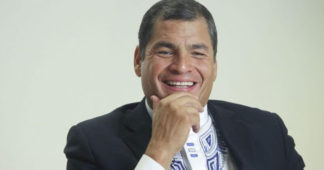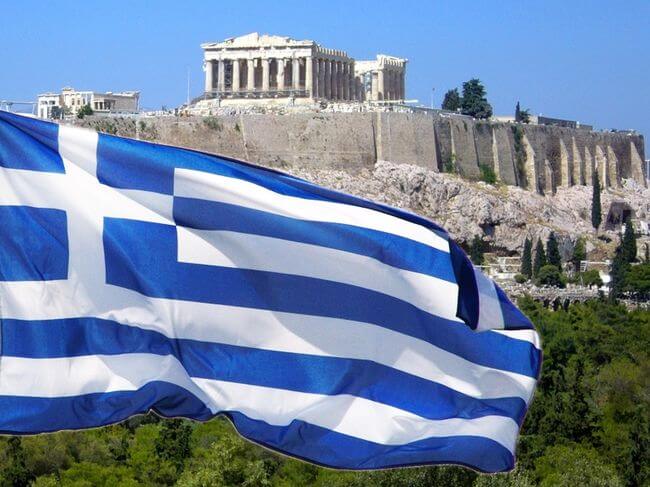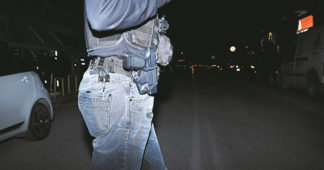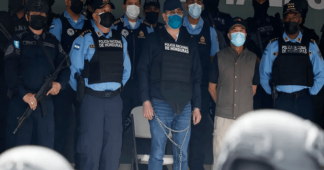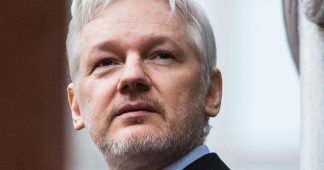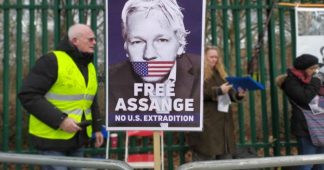Exclusive interviews and leaked messages reveal how a key ally of the US weaponized the fight against corruption and criminal organizations to selectively prosecute Ecuador’s heads of state, viciously persecuting Rafael Correa and his Revolución Ciudadana movement on flimsy evidence, while delaying investigations into much graver crimes allegedly committed by his successors.
Recently-leaked secret chats obtained by The Grayzone expose how Ecuadorian prosecutor Diana Salazar leaked information to a subject of an ongoing investigation, undermining the prosecution of associates of Ecuador’s current and previous US-aligned presidents, and acted hand-in-glove with the United States government, which essentially selected and controlled prosecutions from Washington.
The shocking revelations of corruption and US meddling in the geopolitically-crucial South American nation have been largely ignored by the US government and corporate media outlets.
By Oscar Leon
A full transcript of this Grayzone documentary by Oscar Leon follows:
“Invading and occupying a country has historically come at a high cost, both financially and in terms of human lives. However, in the 21st century, where asymmetrical warfare prevails, dominating a nation can be achieved through more subtle means. Enter lawfare—an easier and less costly method of steering a key country in the geopolitical chess game.
Despite presiding over Ecuador’s decline from a country with functioning institutions to what some now call a narco-state, Attorney General Diana Salazar has recently been leading what many critics describe as a ‘witch hunt’ against the left-leaning Revolución Ciudadana Movement, under the guise of fighting corruption and narco-trafficking.
While a handful of instances of corruption during Revolución Ciudadana’s decade in power are well-documented, a number of high-profile cases fail to hold up under legal scrutiny. Meanwhile, major cases of corruption and narco-trafficking involving right-wing politicians who support global corporate interests have largely been ignored by the press and quietly ushered into impunity by authorities. The narrative propagated by media conglomerates, which are owned by those with clear stakes in the geopolitical battle, reinforces this bias—a factor that has helped the right-wing win the cultural and electoral battles.
As general elections approach, Attorney General Salazar now faces a trial in Congress. Salazar has publicly labeled the judicial action a ‘narco-trial,’ alleging that unspecified cartel-linked interests are behind the case. This narrative has gained traction in mainstream media, influencing electoral calculations.
The trial was brought on in part by newly-leaked secret chats, obtained by The Grayzone, which were written on an app known for deleting messages after a single viewing. The messages show Salazar leaking information to a subject of an ongoing investigation, refusing to prosecute associates of Ecuador’s current and previous US-aligned presidents, and acting hand-in-glove with the United States government.”
Are presidents being prosecuted selectively?
A.G. Salazar had a hand in cases involving the last 3 former presidents of Ecuador — cases that not only have decided the fate of those politicians but also the political destiny of the entire country. The following questions illustrate the disparity in treatment A.G. Salazar dispensed to each one of these cases.
Was the Correa case a solid case?
In April 2020, former President Rafael Correa was held responsible for up to a billion dollars in damages to the state and received a lifetime ban from holding political office. He was also sentenced to eight years in prison. This case marked a turning point in Ecuador’s political landscape, particularly because, despite the numerous legal battles against him, Correa has been consistently projected to win any election he participated in.
On May 3, 2020, Attorney General Diana Salazar unveiled charges against 26 officials from the Correa administration in a case comparable to a RICO indictment. Salazar argued that a well-organized structure had been collecting bribes in exchange for political favors and government contracts. While the evidence appeared to suggest the existence of such a structure, it did not conclusively link it to Correa himself.
The charges against the former president ultimately centered on the concept of “psychic influx” and a $6,000 loan he took and later repaid using party funds. This led to outrage on both sides, given that “Psychic influx” is a legal concept that did not previously exist in Ecuadorian law. To many, this charge highlighted the lack of sufficient evidence to prove Correa’s guilt. And to others, rather than a “slam dunk case,” it was seen as a weak argument from the prosecution.
In July 2024, allegations surfaced that behind the scenes, numerous judges had come under pressure to convict Correa. Wilman Terán, a high-profile judge who sentenced Correa, testified under oath at a National Assembly hearing that Attorney General Salazar’s envoys had repeatedly pressured him to secure a guilty verdict. Today, Rafael Correa remains exiled in Belgium, and is barred from running for political office in Ecuador. His movement has lost the last three elections.
Why is Lenin Moreno’s case taking so long?
The General Attorney’s office presented 225 pieces of evidence in the case of corruption and embezzlement against former president Lenin Moreno, who steered Ecuador away from the Latin American left and into the US orbit. In the process, Moreno broke numerous promises he’d made to the electorate, which elected him as leftist, but quickly found he governed from the right.
After Lenin Moreno oversaw Ecuador’s withdrawal from UNASUR, a now-dissolved Latin American organization of countries created as a counterweight to the US-dominated Organization of American States, he surrendered Julian Assange to British authorities, and imposed a program of austerity on behalf of the IMF — undoing a decade of social progress in the process.
Along the way, he also appointed Salazar as Attorney General. Critics from the Revolucion Ciudadana movement allege that now she’s paying back the favor by shielding Moreno from any prosecution, an assertion that’s bolstered by Salazar’s close links to the U.S. Embassy. A.G. Salazar is at the heart of the interagency cooperation agreements on many fronts, signed by former president Lasso and ratified by current President Noboa.
Ecuador went from zero cooperation and arguably independence from US influence under Rafael Correa, to signing a number of treaties that give US agents and military total freedom to move around and build anything, anywhere in the country, with total immunity before local courts, over the next decade.
Contrasting with the agency and effort clearly put into the Correa case, the Moreno case moves along much more slowly. Despite abundant and almost definitive evidence of a similar network of corruption against Moreno, and bribes up to 76 million dollars, his case has been noticeably delayed by legal technicalities.
In fact one of the grounds for the political trial against A.G. Salazar is -Non-compliance with Article 442 of the Penal Code in the INA Papers or Sinohydro case- This article requires intervention until the conclusion of the process. The grounds for the charge indicate that there was no intervention for more than two years and three months after the complaint was filed.”
After 2 more years of investigation by the G.A. Office, and despite charges presented for bribery against Moreno and some of his family members, none of the 25 suspects were detained.
The case is suspended for the next few years, while legal information is sent by Spain. At the time of production of this documentary in August 2024, It is unclear whether any of the suspects will go to trial.
Moreno is also accused of crimes against humanity, for the crimes committed in the repression of the 2019 Indigenous and trade unions protests. The man who filed charges, then Ombudsman Freddy Carrion, subsequently became a victim of lawfare himself, who was held under preventative detention by Salazar and the Moreno government for 3 years.
In Carrion’s case, A.G. Salazar was demanding a sentence of 20 years for an accusation of “having the intention to grope”, eventually a panel of female judges denied Salazar’s demands and freed Carrion, after condemning him to the 3 years that Carrion had already served.
Freddy Carrion, former Ombudsman
Freddy Carrion: “At the time I was appointed as Ombudsman, Diana Salazar was the official candidate of Lenín Moreno and Mrs. María Paula Romo for the position of Attorney General. When I denounced them for crimes against humanity, I did so against then-President Lenín Moreno and Mrs. María Paula Romo, who was the Minister of Government and Police.
Undoubtedly, no one ever forgave me for that, especially Mr. Moreno, who was President of the Republic, and Mrs. Romo herself, who controlled the police. There was a relationship between Attorney General Diana Salazar, the prosecutor, and the government, given that the prosecutor had been placed in that position by Moreno. My case was a favor to them in return for Attorney General Salazar’s appointment.” (MOVE)
The power, especially the government of former President Lenín Moreno, along with his henchmen—because they deserve no other name—such as María Paula Romo, then Minister of Government, and Osvaldo Jarrín, then Minister of Defense and commander of the National Police, will never forgive me because I denounced them for crimes against humanity.
Crimes against humanity are imprescriptible. They are timeless. This obviously puts them in a very delicate situation both politically and globally.
In March 2021, I reported them to the State Attorney General’s Office for crimes against humanity. The protests in October 2019 caused immense suffering for Ecuadorian families when several people died due to acts of extrajudicial execution. We cannot forget this. The Public Force conducted very violent actions against the workers.”
FC: “About 11 people died, six of them due to extrajudicial executions, and 20 people lost an eye due to the violent actions of the State.
VO: Shooting protesters in the eyes was and still is a trend, in many countries around the world, police forces have been caught intentionally aiming for protesters’ eyes.
It was determined that the State had a practice or policy of systematic repression effectively aimed at causing harm to those people who were exercising social protest. There was a specific objective and a specific population. That led us to establish the Commission for Truth and Justice that we created in the Ombudsman’s Office.”
VO: The 2019 protests represented a social explosion in response to the reality that the Ecuadorian government had turned sharply to the right, even though it had been elected on a left-wing platform. Lenín Moreno effectively betrayed his voters by implementing a fiscal austerity plan that ended a decade-long period of social investment.
FC: They were trying to send a message to any public authority: if you proceed to report acts of crimes against humanity or any serious violation of human rights, the same thing would happen to you as it did to the ombudsman. That is why they put me in prison.”
VO: “The fact that Carrión spent three years in jail under preventive detention, with no option for bail and without a sentence, clearly runs counter to any notion of rule of law. It’s possible that without the help of his wife, lawyer Prescilla Schettini, who pressured authorities and public opinion, Carrión’s case would still be unresolved.
Priscila Schettini, lawyer, author
Priscila Schettini: “I always knew that my husband was innocent.
We have had evidence, accessed the case file, and reviewed all the documents available. There are videos demonstrating that documents were forged by the Attorney General of the State, Diana Salazar of Ecuador, and that police reports were altered in complicity with the Prosecutor’s Office. High-ranking officers, such as Generals Luna and Tania Varela, who were present on the day of the events, were involved in setting up this situation.
The former government minister, Gabriel Martínez, was aware of this from early in the morning. Additionally, the former secretary of the Presidency, Mr. Jorge Walter, informed one of the officers that they had the full support of the government to bring down the former Ombudsman and remove him from office.
Moreover, we have encountered complicity on the part of the National Court of Justice, one of the highest courts in the country. Out of 21 available judges, I believe 20 have already acted on this case.
While working on the case, we discovered that judges are appointed at the discretion of the president of the National Court, who controls their schedules and assigns judges to secure specific outcomes in various sentences or resolutions.
As a result, we see a completely selective and politicized judicial system.
For telling the truth, speaking out, and fighting for Freddy’s innocence, even the Attorney General Diana Salazar herself requested measures against me from a judge to silence me.”
VO: “On November 28, 2023, Salazar leaked reserved information to the public, including the address for the Carrion-Schettini family home. They were both protected under the local witness protection program, and their location was strictly a secret, yet Salazar published it, and a number of attacks on the home followed.”
PS: “They took hidden photographs of me. They have intimidated me, lynched me in the media, and physically attacked me. I have filed more than 13 complaints with the Prosecutor’s Office, and to date, none have been resolved.
They entered my house. They have fired shots outside my home, men with guns broke into our house, shattered my car window, assaulted me, and pointed a gun at me. All of this is part of a campaign to silence me and Freddy.
VO: Carrión claims that President Moreno, and the powerful geopolitical and economic interests behind him, played a key role in keeping him in jail under preventive detention.
Carrión believes this happened because, as Ombudsman, he witnessed firsthand what he deemed a witch hunt against the Alianza País or “Correísta” movement, and in some cases, he began taking action to defend them.”
Freddy Carrion: “The price I had to pay was imprisonment for three long years in a completely unjust manner, Óscar. With a lot of pain and suffering for me and my family, I found myself completely separated, silenced, and locked in prison.
VO: After leaving the presidency, Moreno traveled to the US. However, when evidence of his corrupt deals was presented in Ecuadorian Courts, the United States allowed Moreno to leave. He now resides in Paraguay under the protection of Ecuadorian diplomatic status.
The upcoming political trial against A.G. Salazar also accuses her of inaction in the case, alleging that she allowed “impunity for the perpetrators and obstructed justice for the victims of state violence.” Another charge is for her role in the incarceration of Freddy Carrion, saying:
“The prosecutor’s omission has allowed the fabrication of a case, and deprivation of liberty of an innocent person.”
Did Salazar save neoliberal banker Guillermo Lasso from narco trafficking charges?
VO: Over the last decade, as the Ecuadorian state was weakened by austerity policies, international criminal cartels took over key areas of the government like ports, security forces, courts, and jails. The country operates with U.S. dollars and exerts minimal control over many institutions, making it a paradise for cartels—not just for sending drugs to the rest of the world but also for laundering its illicit profits.
This rise of criminal structures and narco operations could only have been possible with state complicity at the highest levels. Lenín Moreno and Attorney General Salazar were instrumental in dismantling the Revolución Ciudadana Government. As a consequence, many Ecuadorian state institutions focused on social investment and oversight were shut down or defunded, leading to the collapse of the criminal justice system, which has been ongoing since 2019.
In April, a letter from members of the U.S. Congress to President Biden highlighted evidence suggesting that an anti-narcotics investigation in Ecuador, known as the ‘León de Troya’ case, was halted due to government pressure. In fact, Rodney Rengel, the police officer in charge of the case, was discharged from the force as a disciplinary measure and had to go incognito to protect himself and his family after receiving death threats.
Anderson Boscan: So this is important, the Lasso government initiated a disciplinary process against you. I would suppose that the Noboa government would stop that disciplinary process. Did they?.
Rodney Rengel, former police detective: No, they turned their backs on me. The Ecuadorian State turned its back on me. I am still underground, waiting for some protection for my family at least. This case has taken so much from me, my career, my home, it was a high price to pay, for investigating this case and telling the truth.
Anderson Boscan: What does your case tell your former detective colleagues from the anti drug task force?
Rodney Rengel: “Uff, it tells them to look the other way, to be silent and not tell anything if they ever find somebody powerful during a drug investigation, to better step aside, because they can also be prosecuted and fired over it.”
VO: Rengel’s investigation exposed the business dealings of individuals close to former President Lasso with the Albanian Mafia, or Balkan Mafia Cartel—a drug trafficking organization that had prevailed over other groups and gained control of cocaine trafficking routes to London and the rest of Europe.
The ‘León de Troya’ case initially investigated links between Danilo Carrera, Lasso’s brother-in-law, and businessman Rubén Cherres with Dritan Gjika, a local Balkan Mafia boss who remains at large despite various alleged efforts by authorities to dismantle his organization.
However, recent reports revealed that sources within the Attorney General’s office had tipped off the Balkan Mafia about a planned raid in Spain. Local authorities still allow many companies known to be owned by Gjika to operate to this day.
Given that these cartels are closely linked to the same criminal bands the government is theoretically at war with, these incidents raise serious questions about the Ecuadorian government’s sincerity in prosecuting its ‘war on crime.’
In a strange twist of events, Attorney General Diana Salazar downgraded the charges in the ‘León de Troya’ case from narco-trafficking to organized crime, in a case where many powerful figures, including former President Guillermo Lasso, were involved.
Salazar also opened a second case, named ‘Pampa,’ using the same evidence. But she ultimately only prosecuted low and mid-level operators from the Balkan Mafia and the state, most of whom are still at large and operating. These cases provided a window into a possible political manipulation of justice.”
Rengel: “I don’t understand why an investigation that started as a narco trafficking case, was then diverted as a influence peddling case, and then a new case, “pampa” was opened, about narco trafficking.
Why were some of the suspects in the case separated from others in the “Encuentro” and “Pampa” cases? Like Guillermo Lasso’s brother in law and others like him to be put in the organized crime case, with lower sentences.
And A.G. Salazar then placed other low level operators in the narco trafficking case, with tougher sentences. She divided the suspects and divided the investigations. But both investigations came from the exact same case, the “Leon de troya” case.”
VO: “Ronny Aleaga, a former congressman and former personal friend of Attorney General Salazar, is now a fugitive who sought refuge in Venezuela to escape what he calls ‘political persecution and certain death in an Ecuadorian prison.’
The “Aleaga Leaks” provide a deeper look at how Attorney General Salazar shielded neoliberal banker and former President Guillermo Lasso from a significant narco-trafficking case involving the Balkan Mafia, Mexican cartels, and the Ecuadorian state.
Ronny Aleaga is accused by Attorney General Diana Salazar of being part of an organized crime structure. According to the accusation, Aleaga worked with Leandro Norero, a drug trafficker who was recently murdered in prison.
If the accusations are proven true, Aleaga would have acted as a political operator for a criminal organization that infiltrated Ecuador’s democratic institutions and political parties. This infiltration allegedly reached congressmen from both the right-wing Social Christian Party and the left-wing Revolución Ciudadana movement.
Salazar and Aleaga had a close friendship for years, and Aleaga claimed he recorded their communications using a second phone, for ‘insurance purposes.’ These recordings, verified and notarized by Digital Forensics Now, a data forensics agency based in Florida, contain fifteen hundred chats from the Confide app.
The “Aleaga Leaks” revealed some of the darkest secrets of power, including the geopolitical manipulation of justice systems to influence local politics.”
Rony Aleaga, former Congressman, Revolucion Ciudadana
Rony Aleaga: “In September 2023, before the second electoral round in Ecuador, [Salazar] had to prosecute the León de Troya case for drug trafficking and she changed the criminal offense, [from Narco trafficking to] organized crime and influence peddling, which has nothing to do with with what happened, it is a milder crime, for relatives of then President of the Republic, Guillermo Lasso, who were being accused.
She changed the criminal type of the case. But not only that, she said “I am not going to process [Lasso’s entourage] now because of the [2023] elections I am not going to benefit the [Citizens Revolution].”
VO: The following are some of the chats with Attorney General Salazar recorded by Aleaga. When asked about the chats, Attorney General Salazar stated that her “attention will not be diverted from the cases,” but she did not explicitly deny the veracity of the chats. The Attorney General’s Office refused to use the chats as evidence in any case, questioning the credibility of the forensics agency and the chain of custody of the evidence.
“Because there is no narco trafficking there. There is no narco trafficking in “Leon de Troya”. Influence peddling. In fact, I am going to process this one, after the elections, to avoid helping [Revolucion Ciudadana]. Guillermo Lasso knows this.”
RA: “Imagine a General Prosecutor taking that approach at that moment, in a political issue, when what the Prosecutor’s Office has to do is to investigate crime and punish those allegedly responsible or guilty of that crime, She did not do so.”
VO: Austerity policies imposed for almost a decade have crippled parts of the state, creating areas outside state control. These neglected areas have become breeding grounds for criminal bands working with multimillion-dollar narco cartels like the Sinaloa Cartel, CJNG, and the Albanian Mafia.
This rise of criminal structures and narco operations has only been possible with state complicity, at the highest levels.
RA: “Attorney General Diana Salazar changed the criminal charges because it involved the relatives of the sitting president, allowing these criminal gangs to become entrenched in Ecuador.
They have allowed these mafias to become entrenched. The León de Troya case clearly links the Albanian mafia and the former Minister of Agriculture, Bernardo Manzano, who is closely connected to the current President Daniel Noboa. Manzano, a senior executive of the Noboa Corporation, opened quotas for banana exports to Europe during his tenure.
And do you know who benefited from those quotas? Ghost companies associated with the Albanian mafia. These companies purportedly export bananas, but European ports frequently find drugs hidden in Ecuadorian banana shipments, including those from President Noboa’s own companies.”
The case is also troubling for Attorney General Salazar, as she is believed to have either alerted Aleaga or, at the very least, maintained close contact and shared confidential information with one of the main suspects of a case under her jurisdiction.
Luckily for you didn’t dare asking me anything about the judge. Because, otherwise, I would have prosecuted you.
Because they asked you to tell me. To “The black girl” who allegedly was your lover.
Are you willing to go to jail? Because I am trying to avoid that.
The DEA knows everything, that is the problem. We have to include everything in the investigation. We cannot skip anything.
Do you have a police escort now? Pay attention, your police escorts log your every move.
Don’t worry. I am telling you what we are finding. Until I found elements and told him “leave”.
Trust me.
Influencing elections to defend U.S. interests
VO: On August 9th, 2023, presidential candidate Fernando Villavicencio was murdered as he was leaving a political rally, just days before the general election. Up to that point, the election had a clear leader: Luisa Gonzales, from the Revolución Ciudadana Movement, who was leading by 12 points and on the brink of winning in the first round with more than 50% of the vote.
Before his assassination in 2023, suspicions that presidential candidate Fernando Villavicencio was on the US payroll were confirmed. As the Grayzone reported in 2021, he was one of many social leaders and journalists who had received NED funds for over a decade in a bid to prop up the Correa government’s opposition. Aleaga’s leaked messages could provide first hand confirmation of it.
Immediately after the murder, mainstream TV news and right-wing politicians began blaming the Revolución Ciudadana Movement and Rafael Correa for the killing. The movement never recovered in the polls and lost the election.
Responsibility for the murder seemed to fall on Los Lobos, the enforcement arm of the Balkan Mafia. Eight suspected killers were immediately apprehended, but all of them were promptly murdered once they were, somehow, placed in a prison controlled by …Los Lobos.”
“They want Rafael Correa’s head.”
“Imagine, they murdered Fernando Villavicencio, who, according to [A.G. Diana Salazar]’s words, was an informant for the United States government. This is why they offered, in a historical reward, $5 million. The US ambassador and the secretary of state both offered $5 million for information leading to the capture of Villavicencio’s murderers.”
“What is more, [the Americans] were going to take the suspects to NY, because they killed an informant of the US Government”
That is why [the Americans] are hurt. They wouldn’t do as much, not even for me.
I don’t work for them, [Villavicencio] did.
“But watch out, it was the Los Lobos criminal band who killed Villavicencio.
There is a task force from the European Union, investigating Albanians.
This is heavy. There are 3 FBI offices investigating this. 3 offices. Their technology is stunning.
It is all about phones. That is why there’s so much information. They want Rafael Correa’s head.
They say [Revolucion Ciudadana] is rising in the pools. Yes Rafael Correa. [The Americans] know that if [Revolucion Ciudadana] wins the elections, all the [bilateral treaties] are dead.
Rony Aleaga
“This occurred with the complicity and involvement of the United States ambassador. During a dinner at the embassy with the Attorney General, they already knew and discussed who the murderers were, specifically the Los Lobos criminal group. Yet, they did not publicly reveal this information while there was a media lynching against the political organization Revolución Ciudadana, accusing us [for the killing].”
I was told on Monday night, in the U.S. Ambassador’s Residence. As soon as I left, I asked an Attorney from my office, Attorney General’s Office, to begin working, cooperating with [the Americans], but the suspects got killed.
VO: Despite knowing who had killed Villavicencio, A.G. Salazar kept it to herself, to allow for the media narrative of blaming the murder on Revolucion Ciudadana to spread.
“Ecuador’s State Attorney General, Diana Salazar Méndez, has been the precursor of political persecution. She has acted like a bishop in a macabre game of chess, utilized to persecute all the political adversaries of the right, which has taken over Ecuador at this moment.
“I am going to Washington DC. For real, this is at a really high level. For Maduro, the investigation is for narco trafficking.”
But this was not the first time A.G. Salazar had directly influenced an election. In 2021, right before the election, Salazar traveled to Colombia and publicly announced that Revolución Ciudadana’s presidential candidate Andrés Arauz had received money from the ELN, a Colombian guerrilla group.
These accusations quickly faded after Arauz lost the election. A lawsuit was eventually filed by Arauz against Francisco Barbosa, the Colombian A.G., after experts demonstrated that the evidence used in the public accusation was false.
Taking over the entire judicial system?
Using chats from the phone of deceased drug lord Leandro Norero as evidence, Ecuador’s Attorney General Diana Salazar presented a series of extensive anti-corruption cases, resulting in the detention of dozens of judges and judicial workers. At first glance, this appeared to be a much-needed measure for a justice system riddled with corruption. But could it be that this case was also used as a tool to eliminate rivals, seize control, and secure key positions of power within the three branches of the state on behalf of U.S. interests?
As always, it depends on who you believe. Consider Wilmer Terán, a former judge in charge of the “bribes case” against former President Correa, who was detained by orders of A.G. Diana Salazar in the context of a massive case involving 900 people.
Teran presented his own chats with Mayra Salazar, some sectors of the assembly demanded an investigation because “These cases could lead to crimes of influence peddling, procedural fraud, embezzlement, conflict of interest and direct interference in the Judicial Council.”
Terán had crossed one of A.G. Salazar’s operators, Judge Walter Macías, whom Terán, then Chair of the Judiciary, had disciplinarily discharged.
Despite many judges vouching for him, and even an official letter from the Judicial Council supporting Terán and calling the massive operation a “political coup against the judicial branch,” Terán’s home was raided, and he was sent to solitary confinement in a maximum-security prison.
When a competent panel of judges ruled on a motion to transfer Terán to a lower security-level prison “where he can have the conditions to work on his defense,” their office was raided, and they were accused of corruption as well. Terán had recently come forward under oath in Congress to detail how Salazar pressured him and others by sending emissaries to obtain a guilty verdict for Correa.
Currently, Salazar awaits the beginning of her political trial. Knowing she has the political alliances and votes to avoid any meaningful sanction, she stands firmly in control of the Attorney General’s office while publicly labeling her political adversaries as “narcos.”
It is fairly unprecedented to have an A.G. exert such influence over the three branches of the state—raiding judges’ homes at will, opening investigations into political opponents that remain open for years with no clear cause until one is found, and influencing elections. The power of an Attorney General, supported by the political right, the U.S. Embassy, and the media, has taken control of Ecuadorian politics.
We remind our readers that publication of articles on our site does not mean that we agree with what is written. Our policy is to publish anything which we consider of interest, so as to assist our readers in forming their opinions. Sometimes we even publish articles with which we totally disagree, since we believe it is important for our readers to be informed on as wide a spectrum of views as possible.
